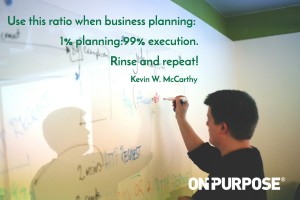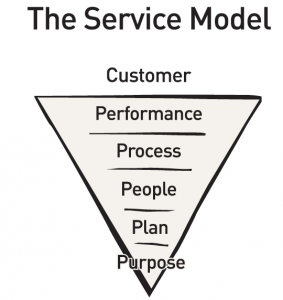Writing a business plan?
It is hard to argue against the idea of writing a business plan, yet experience tells me very few business owners actually write one.
Wrong choice! In this fast-paced dynamic business environment, a business purpose and plan have never been more needed. They’re essential to decisions and growth regardless of the business size.
The problem isn’t with the business plan, per se; it is the speed of the person creating the business plan which makes it irrelevant to the business. Most business owners aren’t skilled as business plan writers so their mythologies and misgivings are often unfounded in reality. Speed  comes with experience and practice.
comes with experience and practice.
Too many times, I’ve heard business owners lament that they don’t have time to do a business plan. Hint: maybe the reason they don’t have time is because they’re not working from a plan. That’s more a comment about their limited skills, experience, and understanding or unwillingness to get help.
60-Minute or Less Simple Planning Method
Consider the old adage, “If you have only a day to cut down a tree with an ax, then invest time sharpening the ax before you begin.” Let me add: Continue to check and sharpen it throughout the day. A business plan is a sharp ax that you can take to the forest of business challenges you face and make progress faster, more affordable, and with less energy … sounds like profits to me!
Pull out a blank sheet of paper, go to a whiteboard or flip chart, or open an electronic file to capture your thoughts. Do the brain dump! Then sort it out into a more coherent and logical flow of actions steps. Assign people and dates and you’re ready to go!
A simple idea-clarifying informal business plan can often be done in less than 60 minutes. Practice the following method on smaller projects where the risk, scale, and scope aren’t so large. Practice the process on less demanding content and matters and you’ll be preparing for writing the business plan for the entire business.
Who Are You Fooling?
I’ve even been told by business owners, “A business plan isn’t relevant to my business.” There may be a good reason why business planning is often put aside, but dismissing it as irrelevant is risky business. While creating a business plan is something every entrepreneur or CEO is wise to do, they often don’t. It is a unique skill set that they don’t invest time in learning how to do. In their minds, it seems to be an exercise for the academics and not for people of action.
Reconsider what the pros do.
For example, your favorite NFL team has a plan for the franchise, the season, and a game plan and playbook going into every game for every week of the season for as long as they’re winning into the post-season. They’re professionals who have learned to crank out a “business plan” for every week. To get the results they seek they don’t have an option. Even then, games will be lost. Lessons learned and personnel trained to improve.
Action, even well-intended actions, without a purpose and a plan incrementally lower the trajectory of achievement.
Business planning, hey, it’s optional. That’s a dangerous mindset fraught with avoidable pitfalls. Running by the seat of one’s pants can become a way of life and business. Could this be part of the explanation why the failure rate of small businesses is so high?
Candidly, if taxes didn’t have to be paid, I wonder how many small business owners would have a financial and accounting system in place! Because the IRS likes to be paid and has means of enforcement to be paid, bookkeeping and accounting are done because outside consequences exist. Because business planning is “optional,” it is too easy to not get it done.
So what is the purpose of a business plan?
It helps to know that there are three broad types of business plans:
- Financing business plans are done to obtain financing from either investors or lenders. These business plans tend to be formal and time consuming because of the scrutiny of due diligence. Most business planning software leans in this direction.
- Functional business plans are more operational or oriented towards helping team members get on the same page to move the business forward. These blueprints for the business are informative and best used for internal use, direction, and communication.
- Strategic business plans are very useful, for example, for taking your business ideas and transforming them into a business model. These can be very informal—notes on a yellow pad or napkin—to PowerPoint presentations to more formally written documents.
Audience Matters
Who is going to be reading your business plan and why? Your need for a business plan really depends upon the audience for whom it is written.
- Financing business plans are targeted toward outsiders to attract investment.
- Functional business plans involve engaging the team. There is a certain amount of assumed inside knowledge.
- Strategic plans are best written for the leader of the plan to gain insight and clarity. This enables the entrepreneur to capture thoughts and sort the various elements of a business into an orderly approach.
 Each of these business plans has common elements that you’ll find layered in The Service Model™ (see graphic) from The On-Purpose Business Person.
Each of these business plans has common elements that you’ll find layered in The Service Model™ (see graphic) from The On-Purpose Business Person.
Creating a business plan is something every entrepreneur should do, but you need to know why you are writing the business plan and the audience.
I’ve seen far too many start-up organizations buy business planning software and invest months writing it. The process of doing their market research, developing cash flow statements, defining their organizational chart, etc. is useful, but is the marginal return on investment worth it? Sometimes you just need to get started and prove your concept in order to improve your business model.
Practically, it is rarely as valuable as the benefit of having a simple business plan and getting started. There’s nothing quite like opening the doors on a small scale and learning from the market. This said, if you have only one part of a business plan to get right—put together your business marketing plan.
Planning is not about perfection.
Rather it is about anticipating pitfalls and avoiding them, as well as leveraging opportunities to the max. Plans are meant to save us time, money, and energy. Always consider the ROI (return on investment) for your planning process.
Over the years, I’ve told my clients to use this ratio when business planning: 1% planning:99% execution. Rinse and repeat!
On-Purpose Business Tip: The Service Model from The On-Purpose Business Person provides a simple business plan template to provoke thoughtful inquiry and usefulness.


![Reblog this post
[with Zemanta]](http://img.zemanta.com/reblog_e.png?x-id=a6c9f53e-8afd-4077-8f46-81e2598db449)

